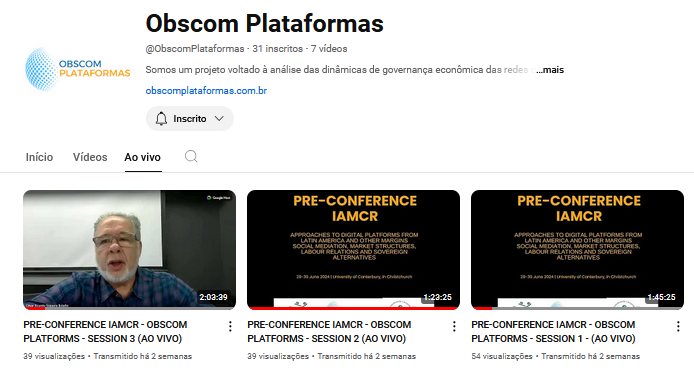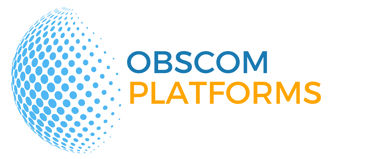Pre-conference IAMCR - OBSCOM PLATFORMS 2024
Economic Governance of Digital Platforms Project (UFS/FAPESP) promotes pre-conference at international event (IAMCR 2024)


On the 29th and 30th of June, the annual Pre-Conference of the International Association for Media and Communication Research (IAMCR) took place in Christchurch, New Zealand, entitled “Digital platform approaches from Latin America and other margins: social mediation, market structures, labor relations and sovereign alternatives”.
At the occasion, the project “The economic governance of digital networks: for an analysis of internet markets and competition and their impacts on user rights” financed by FAPESP and coordinated by professor César Bolaño, discussed over three debate sessions, research projects developed by several researchers in the field of Political Economy of Communication from different regions of the globe.
The sessions “The problem of work”, “Market structures and agents’ strategies” and “Sovereign responses”, promoted a rich exchange of experiences from different regionalities with their own characteristics, contributing to a general advance in understanding around labor relations production in the media and communication, as well as in the improvement of possible work methodologies adopted by the researchers present.
The Pre-conference was broadcast via the YouTube channel Obscom Plataformas, the recording of the event can be watched via the link: https://www.youtube.com/@ObscomPlataformas
SESSION 1: The problem of work
June 29th (Saturday), 2pm-4pm
i) Subsumption of labor in contemporary times
César Ricardo Siqueira Bolaño (Federal University of Sergipe – Brazil)
ii) Work mediated by digital platforms
Jonas Chagas Lúcio Valente (Oxford Internet Institute - UK)
iii) Amazonia, territoriality and platformization: a case study of the Urbano Norte app and its social mediation structures
Ana Cirne Paes de Barros; Cândida Nobre; José Maria Mendes (Federal Institute of Science and Technology of Rio Grande do Norte - Brazil)
iv) Plataformización del trabajo audiovisual en Argentina, preguntas y desafíos metodológicos en la configuración de un sector
Juan Martín Zanotti, Florencia Guzmán (Universidad Nacional de Córdoba, CONICET, Universidad Nacional de San Luis - Argentina)
SESSION 2: Market structures and agents' strategies
June 29th (Saturday), 16h30-18h30
i) Platformization and structure of digital markets
Helena Martins (Universidade Federal do Ceará - Brazil)
ii) The power of platforms over the news industry in Latin America
Diego García Ramírez (Universidad del Rosario - Colômbia)
iii) Fiction After Television. Infrastructure and Economic Agents of a Platformed Format
Ezequiel Rivero (CONICET, Universidad Nacional de Quilmes - Argentina)
iv) Big data in emerging markets: the conceptualization of public goods
Federico Beltramelli (Universidad de la República - Uruguay)
v) Being an 'ICHINA' Online - Everyday Discursive (Re)production of Internet-Mediated Chinese National Identity in the Era of Consumerism and Fandom
Zhiwei Wang (University of Edinburgh)
SESSION 3: Sovereign Responses
June 30th (Sunday), 2pm-4pm
i) Neocolonialismo en el sector info-comunicacional: Soberania tecnológica y recursos geológicos en América Latina. Daniela Inés Monje (Universidad Nacional de Córdoba - Argentina)
ii) Isabel Ramos (Facultad Latinoamericana de Ciencias Sociales - Ecuador)
iii) Brazil's Sovereign Responses to Disinformation and Platform Governance
Giovanni Francischelli (PhD student in Media Studies at the University of Oregon)
iv) Audiovisual platforms on the margins. The limits of market structures and policy responses in Europe's periphery
Jaka Primorac (Institute for Development and International Relations); Helena Popović (Faculty of Humanities and Social Sciences, University of Zagreb)
iv) A Panoramic View of Online Polarization Across Latin America's Digital Landscapes: Definitions, determinants, methods and results from Brazil, Mexico, Argentina, Peru and Colombia
Tariq Choucair; Kate O'Connor Farfan (Digital Media Research Center - Queensland University of Technology)
